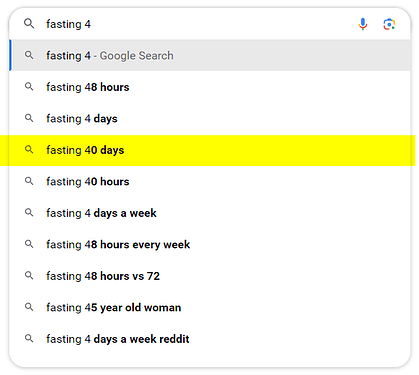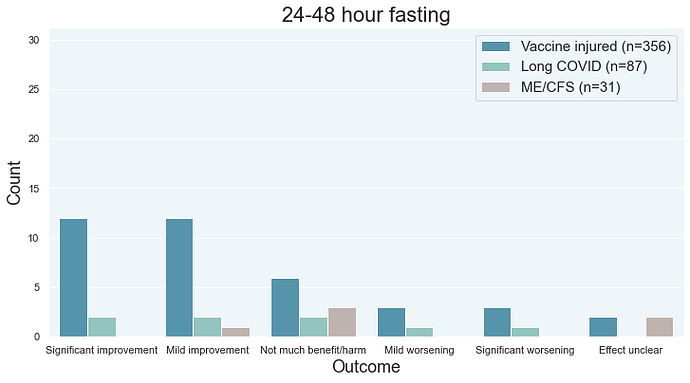Fasting for more than 2 days is one of the top treatments according to people who have recovered. But this treatment may seem crazy. So let’s start with the (crazy) fasting people out there. If you do a Google search and start typing in “fasting 48 hours”, Google will be like… hey do ya want to know about people who fast for 40 days?!?!
And if you do a Google search for “site:reddit.com fasting 40 days”, you’ll find that a lot of people are actually talking about 40 day fasting on Reddit. It’s a thing. It’s probably unnecessarily extreme for treating chronic illness, but there are people out there doing it.
The world record for fasting is 382 days. But… that person (Angus Barbieri) took a multi-vitamin, tea, and coffee.
The flip side of that is that some people find fasting to be really hard. One possibility is that it takes weeks for your body to become adapted to use fat for energy.
Becoming fat adapted and “keto flu”
There are ketogenic diets (and meat only diets) where people try to eat very low or zero carbs. This forces the body into producing ketones. Without carbs, the body must use ketones for energy instead of glucose. The body may go through an adaptation period for 2-4 weeks where it gets better and better at using ketones for energy. Until that adaptation is finished, studies find that participants are not as good at exercising.
See Stephen Phinney’s review paper (DOI:10.1186/1743-7075-1-2). Here’s an excerpt if you like reading science:
Adaptation
The most obvious of these is the time allotted (or not) for keto-adaptation. In this context, the prescient observation of Schwatka (that adaptation to “a diet of reindeer meat” takes 2–3 weeks) says it all. None of the comparative low-carbohydrate versus high-carbohydrate studies done in support of the carbohydrate loading hypothesis sustained the low carbohydrate diet for more than 2 weeks [5], and most (including the classic report of Christensen and Hansen [2]) maintained their low-carbohydrate diets for 7 days or less.
There are to date no studies that carefully examine the optimum length of this keto-adapataion period, but it is clearly longer than one week and likely well advanced within 3–4 weeks. The process does not appear to happen any faster in highly trained athletes than in overweight or untrained individuals. This adaptation process also appears to require consistent adherence to carbohydrate restriction, as people who intermittently consume carbohydrates while attempting a ketogenic diet report subjectively reduced exercise tolerance.
People in diet communities often refer to that adaptation period as “keto flu”. There’s a lot of advice about it but I don’t know how reliable any of that advice is. If you want to become keto adapted without doing things the hard way, you can always ease into it and spend more time becoming keto adapted.
I have no idea if keto adaptation would explain why some people have a tough time with fasting.
Fasting does get easier once you move past the initial hunger stage.
Safety - fasting (>24 hours) is not among the safe treatments
Firstly, fasting can interact with the drugs and supplements that you are taking. Food can affect how your body processes drugs.
Secondly, fasting is among the medium and highest-risk treatments out there.
Search for extended fasting and 24-48 hour fasting at Treatment Outcomes Survey analysis
Fasting is ‘hard’ for some people because they are getting weird and/or horrible side effects from it… it’s probably not because the fasting itself is hard.
Intermittent fasting is safer and you can start there.
Recap
I haven’t read that much of the scientific literature as to why some people find fasting to be really difficult. However, while the idea of fasting may be foreign to our modern-day lifestyles (where food is so easy to get), people have been doing for millennia. I think we’re socially conditioned to think that it’s harder than it actually is.
I hope this helps. Please be careful as people do report a lot of negative experiences from fasting… it’s in the top sixth of treatments in terms of negative experiences being reported.


